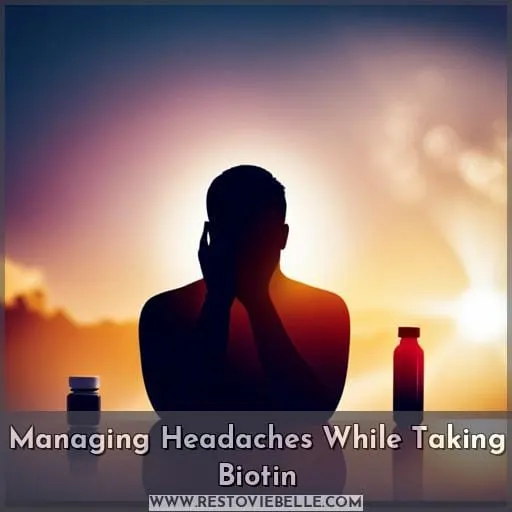This site is supported by our readers. We may earn a commission, at no cost to you, if you purchase through links.
 Curious about the connection between biotin and headaches? You’re not alone. With mixed reviews on its effectiveness, it’s important to separate fact from fiction. While some claim that biotin can cause headaches, scientific evidence is lacking.
Curious about the connection between biotin and headaches? You’re not alone. With mixed reviews on its effectiveness, it’s important to separate fact from fiction. While some claim that biotin can cause headaches, scientific evidence is lacking.
In this article, we’ll debunk the myth surrounding biotin-induced headaches and explore potential causes while providing tips for managing them effectively so you can make an informed decision about your health journey with biotin supplementation.
Table Of Contents
- Key Takeaways
- Can Biotin Cause Headaches?
- The Relationship Between Biotin and Headaches
- Potential Causes of Headaches While Taking Biotin
- Managing Headaches While Taking Biotin
- Seeking Medical Advice for Headaches While Taking Biotin
- Other Common Side Effects of Biotin
- Is Biotin Safe for Everyone?
- Can Biotin Interact With Other Medications?
- Understanding the Recommended Dosage of Biotin
- Natural Alternatives to Biotin for Hair and Nail Health
- Frequently Asked Questions (FAQs)
- Conclusion
Key Takeaways
- Limited scientific evidence on the direct link between biotin and headaches
- Individual variations in response to biotin supplementation
- Importance of adjusting biotin dosage for severe or frequent headaches
- Potential role of hydration levels in managing biotin-induced headaches
Can Biotin Cause Headaches?
- Can Biotin cause headaches?
Yes, it can. While biotin is generally well-tolerated by most individuals, some may experience headaches as a side effect. However, it’s important to note that the link between biotin and headaches isn’t fully understood and there’s limited scientific evidence supporting this connection.
Individual response plays a significant role in determining whether or not someone will experience headaches while taking biotin supplements. Factors such as hydration levels can impact the likelihood of developing this side effect.
Additionally, dosage adjustment might be necessary for those experiencing frequent or severe headaches while on biotin supplementation. Consulting with a healthcare professional before making any changes to your dosage is crucial.
If you’re concerned about experiencing persistent or severe headache symptoms while taking biotin supplements, seeking medical consultation would be advisable to rule out any underlying health conditions that could be contributing to these symptoms.
In conclusion, although some individuals may experience headaches when taking biotin supplements,
the relationship between the two remains unclear and varies from person to person.
Proper hydration and consulting with a healthcare professional are essential steps in managing potential headache causes related
to using biotin.
The Relationship Between Biotin and Headaches
There is limited scientific evidence to support a direct relationship between biotin and headaches.
While some individuals may experience headaches as a side effect of taking biotin supplements, it’s important to note that everyone’s body chemistry is different and reactions can vary.
It’s always recommended to consult with your healthcare professional if you have concerns about the potential effects of biotin on your headache symptoms.
Known Side Effects of Biotin
If you’re considering taking biotin and have concerns about potential side effects, it’s important to understand the known side effects of biotin and whether headaches are among them.
While scientific evidence linking biotin to headaches is limited, individual variations in response can’t be ruled out. Some individuals may experience discomfort such as headaches while taking biotin supplements.
Managing this discomfort may involve adjusting the dosage, staying hydrated and well-nourished, and practicing stress management techniques.
If you experience persistent or severe headaches while taking biotin, it’s advisable to seek medical advice for further evaluation.
Lack of Scientific Evidence
There is limited scientific evidence to support a direct relationship between biotin and headaches.
While some individuals may experience headaches while taking biotin supplements, it’s important to consider other factors such as individual responses and nutritional influences.
Headaches can have various triggers, including stress, dehydration, or dietary factors unrelated to biotin intake.
To debunk the misconception that biotin causes headaches, further research with scientific rigor and quality testing is needed to establish any potential link between the two.
Individual Variations
One possible cause of headaches while taking biotin is individual variations in how the body reacts to the supplement.
The relationship between biotin and headaches can be influenced by:
- Genetic factors
- Lifestyle choices
- Hormonal impact
- Dietary habits
- Environmental triggers
These factors differ from person to person, leading to varying experiences with biotin-induced headaches.
It’s important to recognize that not everyone will experience headaches while taking biotin and that individual variations play a significant role in this phenomenon.
Potential Causes of Headaches While Taking Biotin
If you experience headaches while taking biotin, there could be various potential causes.
- One possibility is that you may be overdosing on biotin, which can have adverse effects such as headaches.
- Another factor to consider is the individual’s sensitivity or intolerance to biotin supplements.
- Additionally, other ingredients in the supplement or lifestyle factors such as dehydration or stress could also contribute to headaches while taking biotin.
Biotin and headaches
Experiencing headaches while taking biotin can be a common concern for individuals. However, scientific evidence on the direct link between biotin and headaches is limited.
While some people may report headaches as a side effect of biotin supplementation, individual variations in response to the vitamin are important to consider. Other factors such as hydration status, nutrition, stress levels, and overall health can also contribute to headache development while taking biotin.
Adjusting dosage or exploring natural alternatives may help manage any potential discomfort associated with headaches during biotin supplementation.
| Biotin and Headaches | |
|---|---|
| 1 | Scientific Evidence |
| 2 | Individual Variations |
| 3 | Headache Risk Factors |
| 4 | Adjusting Dosage |
Headache risk factors
Managing headaches while taking biotin involves understanding the potential headache risk factors.
Some common headache triggers include:
- Nutritional imbalances
- Dehydration
- Individual tolerance to medications
It’s important to maintain a balanced diet and stay hydrated when taking biotin to minimize the impact on headaches. Additionally, dosage adjustment may be necessary if headaches persist or worsen.
Remember that not everyone experiences headaches while taking biotin, so it’s essential to listen to your body and consult with a healthcare professional for personalized advice.
Managing biotin-induced headaches
To manage biotin-induced headaches, it’s important to understand the potential causes and take appropriate steps.
- Adjusting your dosage of biotin may help alleviate the symptoms.
- Ensuring proper hydration and nutrition can have a positive impact on headache management while taking biotin.
- Implementing stress relief techniques such as relaxation exercises or meditation may also contribute to reducing headaches.
If headaches persist or worsen, it’s recommended to seek medical consultation for further evaluation and guidance in managing this side effect of biotin supplementation.
Managing Headaches While Taking Biotin
To manage headaches while taking biotin, there are a few strategies you can try.
First, consider adjusting your dosage and consult with your healthcare provider to find the right amount for you.
Additionally, staying hydrated and maintaining good nutrition can help prevent headaches.
Finally, managing stress through relaxation techniques or exercise may also alleviate headache symptoms while taking biotin.
Adjusting Dosage
If you’re experiencing headaches while taking biotin, you may need to adjust your dosage.
Some individuals are more sensitive to certain substances and may respond differently to biotin supplementation.
Dosage adjustment can help alleviate headache symptoms by finding the right balance that works for your body.
It’s important to consult with a healthcare professional who can provide guidance and support in determining the appropriate dosage based on your individual responses and medical history.
Adjusting your dosage is an essential step in managing headaches while taking biotin.
Hydration and Nutrition
Stay hydrated and maintain a balanced diet to help manage headaches while taking biotin.
Here are some hydration tips and nutrition myths to keep in mind:
- Drink plenty of water throughout the day to stay hydrated.
- Incorporate foods rich in vitamins C, E, and B-complex into your diet for optimal hair health.
- Avoid excessive consumption of caffeine as it can contribute to dehydration and trigger headaches.
- Aim for a well-rounded diet that includes fruits, vegetables, lean proteins, whole grains, and healthy fats.
By prioritizing hydration and following sound dietary habits, you can support overall wellness strategies while debunking the myth that biotin causes headaches.
Stress Management
Manage headaches while taking biotin by incorporating stress management techniques.
Stress can contribute to the frequency and intensity of headaches, so it’s important to prioritize relaxation and self-care.
Engage in activities that promote holistic well-being, such as exercise, meditation, or yoga.
Take breaks throughout the day to reduce tension and practice deep breathing exercises.
Additionally, ensure you’re maintaining a balanced diet and staying hydrated as proper nutrition can play a role in headache management.
Remember that lifestyle impact plays a significant role in managing headaches while taking biotin.
Seeking Medical Advice for Headaches While Taking Biotin
Now that you have some strategies for managing headaches while taking biotin, it’s important to know when to seek medical advice. If you’re experiencing persistent or severe headaches that are interfering with your daily activities, it may be time to consult a healthcare professional.
They can help determine if the headaches are related to biotin or if there might be another underlying cause.
When seeking medical advice for headaches while taking biotin, here are some key considerations:
- Dosage Adjustments: Your doctor may recommend adjusting your dosage of biotin based on the severity and frequency of your headaches.
- Hydration Strategies: Ensuring proper hydration is essential in managing any type of headache. Drinking enough water throughout the day can help alleviate symptoms.
Other Common Side Effects of Biotin
If you experience other common side effects while taking biotin, it’s important to seek medical advice.
While headaches are often associated with the use of biotin, there are several other potential side effects that individuals may encounter.
- Brittle nails
- Seborrheic dermatitis (a skin condition characterized by redness and flaking)
- Hair loss
- Skin rash
It’s essential to note that not everyone will experience these side effects. Individual tolerance varies when it comes to biotin supplementation. Some individuals may be more prone to experiencing certain side effects than others.
To prevent or manage these common side effects while taking biotin, there are a few nutritional considerations you can keep in mind:
- Ensure an adequate intake of water: Staying hydrated can help alleviate some symptoms such as dryness and itching associated with skin conditions like seborrheic dermatitis.
- Maintain a balanced diet: Incorporating nutrient-rich foods into your meals can support overall hair and nail health.
- Consider consulting a healthcare professional: They can provide guidance on dosage adjustments or recommend alternative approaches if the current regimen is causing unwanted symptoms.
By being aware of these potential side effects and taking appropriate measures for headache prevention through proper nutrition and medical consultation if necessary, you can make informed decisions about using biotin for your personal wellness goals.
Is Biotin Safe for Everyone?
While discussing the potential side effects of biotin, it’s important to consider whether biotin is safe for everyone. Biotin safety can vary depending on individual factors and health conditions. It’s crucial to consult with a healthcare professional before starting any new supplement, especially if you have pre-existing medical conditions or are taking other medications.
Individual variations play a significant role in determining how someone may respond to biotin supplementation. Some individuals may experience no adverse effects at all, while others could be more susceptible to side effects such as headaches when taking high doses of biotin.
Headache risk factors should also be taken into account when considering the safety of using biotin supplements. If you have a history of migraines or frequent headaches, it might be wise to proceed with caution and monitor your symptoms closely while taking biotin.
If you do experience headaches while taking biotin, dosage adjustment might help alleviate this symptom. Lowering the dosage or spreading out your intake throughout the day could potentially reduce headache frequency or intensity.
In any case, seeking medical consultation is key when dealing with potential side effects from any supplement. A healthcare professional can provide personalized advice based on your specific situation and guide you towards an appropriate course of action.
Can Biotin Interact With Other Medications?
When taking biotin, it’s important to be aware of any potential interactions with other medications you may be using.
Biotin is generally considered safe and well-tolerated, but like any supplement or medication, it can have interactions and adverse reactions when combined with certain drugs.
While there are no documented reports suggesting that biotin directly interacts with specific medications, it’s always recommended to consult healthcare professionals before starting any new supplements.
It’s crucial to inform your doctor about all the medications you’re currently taking so they can evaluate whether there might be a risk of interaction with biotin.
Certain medicines may affect the absorption or metabolism of biotin in your body, potentially altering its effectiveness or causing side effects.
Additionally, some drugs might interfere with the lab tests measuring levels of certain substances influenced by high doses of biotin. This interference could lead to inaccurate results and misdiagnosis if not properly communicated between patients and healthcare providers.
To ensure safety while taking both prescription medications and dietary supplements like biotins simultaneously, consulting medical professionals should always remain a top priority for optimal health outcomes.
Understanding the Recommended Dosage of Biotin
To understand the appropriate amount of biotin to take, consult with a healthcare professional. They can provide personalized dosage guidelines based on factors such as your age, sex, overall health, and specific needs.
The recommended daily intake for biotin is typically around 30 micrograms for adults. However, higher doses may be necessary in certain cases where there’s a deficiency or underlying medical condition.
It’s important to note that taking excessive amounts of biotin can have potential health impacts and overdose risks. While biotin is generally considered safe when taken within the recommended dosage range, individual variations in metabolism and tolerance levels can affect how it interacts with your body.
Maintaining nutritional balance through a varied diet rich in natural sources of biotin like milk, carrots, salmon, and nuts should also be prioritized alongside supplementation if needed.
Ultimately, the goal should always be achieving optimal health without compromising safety. So, don’t rely solely on myths or self-diagnosis; instead, take charge by seeking professional guidance regarding the recommended dosage of biotin.
Natural Alternatives to Biotin for Hair and Nail Health
Now that you have a better understanding of the recommended dosage of biotin, let’s explore some natural alternatives for promoting hair and nail health.
If you’re looking to enhance your hair and nails without relying solely on biotin supplements, there are several holistic approaches that can support their growth and strength.
- Herbal Remedies: Certain herbs like rosemary, lavender, and horsetail contain nutrients that promote healthy hair growth when applied topically or consumed as teas.
- DIY Masks: Create nourishing masks using ingredients like avocado, coconut oil, honey, or eggs to provide essential nutrients directly to your scalp and nails.
- Scalp Massage: Regularly massaging your scalp stimulates blood flow to the follicles while also reducing stress levels which can contribute to healthier hair growth.
Additionally,
incorporating Ayurvedic solutions such as amla (Indian gooseberry) juice or Brahmi oil may help strengthen both strands of
hair
nails by providing vital nutrients from within.
By embracing these natural alternatives alongside maintaining a balanced lifestyle,you’ll be able to achieve strong,hair,nailsthat radiate with vitality.
Frequently Asked Questions (FAQs)
What are the potential causes of headaches while taking biotin?
Headaches while taking biotin may have multiple causes.
Possible reasons include:
- Overdosing on biotin
- Individual sensitivity to the supplement
- Interactions with other medications
Consult a healthcare professional for personalized advice and guidance.
How can headaches be managed while taking biotin?
To manage headaches while taking biotin, ensure you aren’t exceeding the recommended dosage.
Stay hydrated and maintain a balanced diet.
If headaches persist, consult with a healthcare professional for further guidance.
When should I seek medical advice for headaches while taking biotin?
Seek medical advice if you experience persistent headaches while taking biotin.
Although there are no documented direct links between biotin and headaches, it’s important to consult with a healthcare professional for proper evaluation and guidance.
Are there any other common side effects of biotin?
Biotin generally has no common side effects, but individual experiences may vary.
While headaches are unlikely, it’s important to consult a healthcare professional if you have any concerns or unusual symptoms.
Can biotin interact with other medications?
Biotin can interact with certain medications.
It’s important to consult with your healthcare provider before taking biotin supplements, especially if you’re on other medications, to ensure there are no potential interactions or adverse effects.
Conclusion
Ultimately, the myth surrounding biotin-induced headaches has been debunked.
While some individuals may experience headaches while taking biotin, there’s no scientific evidence to directly link biotin supplementation to headaches.
Various factors, such as individual variations and other underlying causes, may contribute to headaches while taking biotin.
It’s important to manage headaches effectively by adjusting dosage, maintaining hydration and nutrition, and managing stress.
If headaches persist or worsen, seeking medical advice is recommended.
Biotin remains a safe and beneficial supplement for many individuals.















